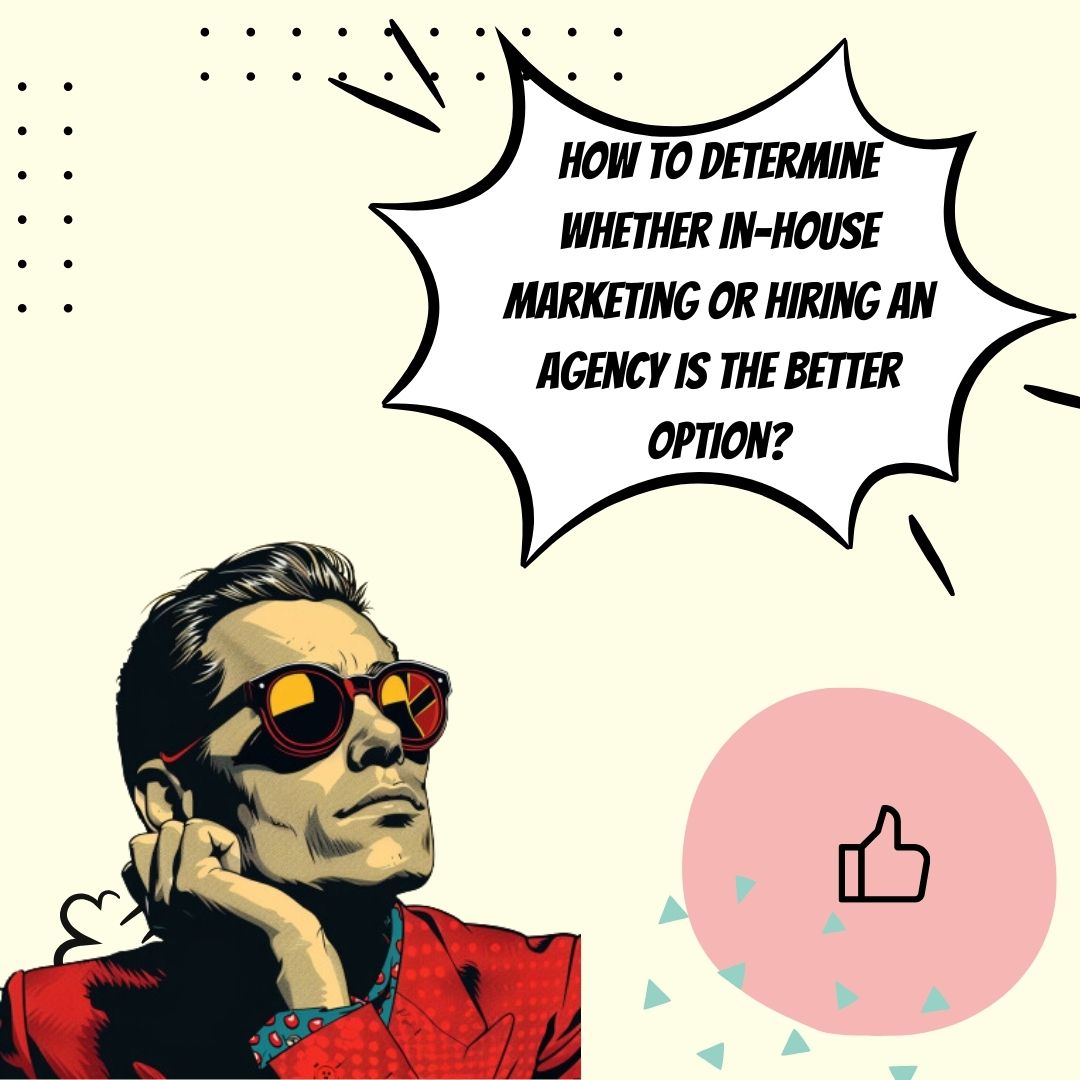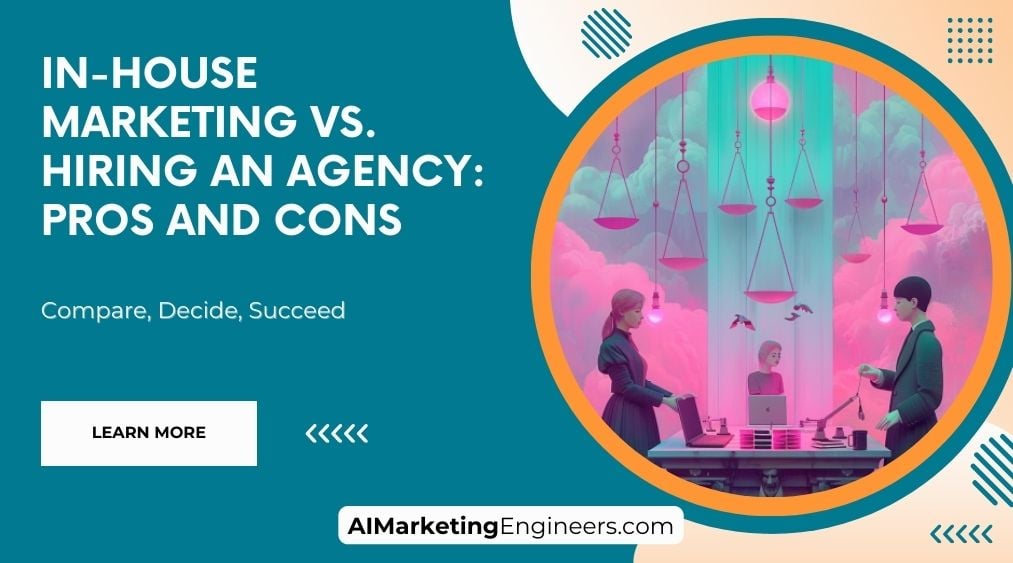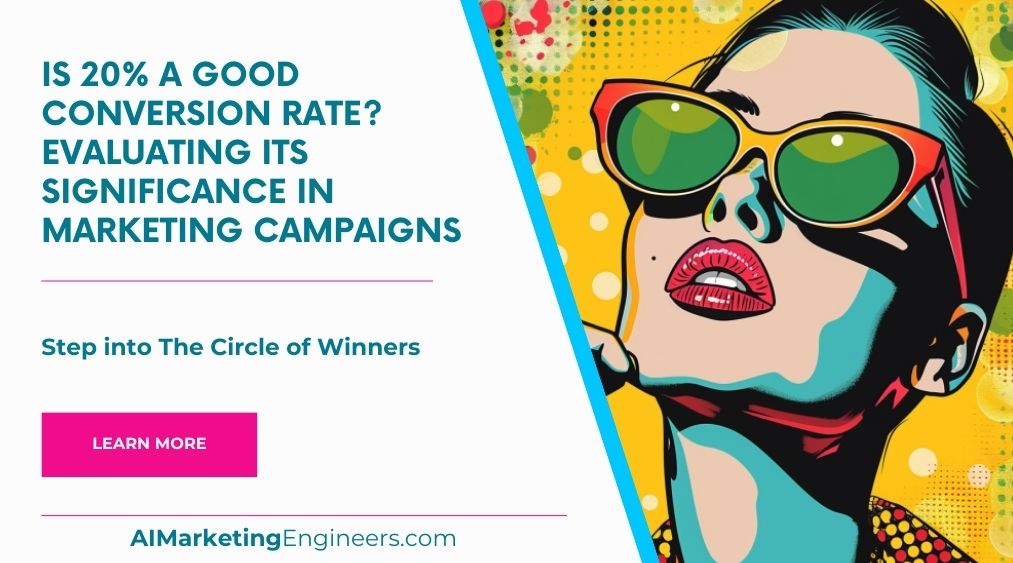Key Takeaways
✅ Control and Accessibility: In-House Marketing: Offers greater control and immediate accessibility, promoting agile decision-making and a personalized approach backed by a deep understanding of the company's brand and culture. Agency Marketing: May lack immediate control and accessibility. However, agencies bring specialized expertise and resources, resulting in faster results and diverse strategies.
✅ Cost and Resource Considerations: In-House Marketing: Requires significant investment in team hiring, software, and resource management. This can be particularly costly for smaller companies, necessitating careful budgeting. Agency Marketing: Often more cost-effective due to existing infrastructure but might offer less personalized attention as they juggle multiple clients.
✅ Expertise and Scalability: In-House Marketing: Allows specialized industry knowledge but is limited by the internal team's skills. Hiring an expert can offset these limitations. Agency Marketing: Accesses broad skills and can easily scale efforts, but may lack specific industry insight compared to an internal team.

Introduction
Is your business struggling to decide between in-house marketing and hiring an agency? Understanding the pros and cons of each approach is crucial for optimizing your marketing strategies and maximizing ROI. With the increasing complexity and competitiveness of the market, businesses must choose wisely to stay ahead. This article explores the key differences, benefits, and drawbacks of in-house versus agency marketing, offering fresh perspectives and actionable insights to guide your decision. Dive in to uncover the insights that could transform your marketing efforts.
Top Statistics
| Statistic | Insight |
|---|---|
| 82% of marketers now use an in-house agency, an increase from 58% in 2013. | This rise in in-house agencies underscores businesses' shift towards greater control over their marketing efforts. |
| 69% of junior and mid-level marketers are seeking in-house roles, compared to just 11% seeking agency work. | Indicates a growing preference among marketers for in-house positions, potentially driven by factors like job stability and alignment with organizational goals. |
| 92% of respondents still use external agencies, highlighting their enduring relevance in marketing strategies. | While in-house agencies grow, the reliance on external expertise remains strong, balancing specialized skills and perspectives. |
| 65% of respondents have moved some business from external agencies to in-house. | This shift showcases companies' confidence in their internal capabilities and a push towards cost-efficiency and tighter integration. |
| The average cost of in-house marketing is $250,000 per year, while agency marketing ranges from $20,000 to $200,000 per year. | This highlights a critical cost consideration, where agency marketing can be more variable and potentially less expensive, but may lack the consistent control in-house teams offer. |
In-House vs. Agency Marketing: Weighing the Pros and Cons
When it comes to marketing, businesses often find themselves at a crossroads between in-house and agency marketing. Each route offers its own set of advantages and drawbacks, and understanding these can help make an informed decision.
In-House Marketing: Pros and Cons
In-house marketing relies on an internal team dedicated solely to promoting the business. One of the major advantages here is brand familiarity. An internal team deeply understands the brand's ethos, values, and objectives, making their campaigns naturally aligned with the company's goals. Accessibility is another benefit, as team members are readily available for meetings and quick decisions. This increased accessibility often translates into enhanced focus and control over projects.
However, the downsides cannot be ignored. A significant limitation of in-house marketing is the often constrained capacity of human resources. Even the most talented team may struggle to cover all bases, from social media to SEO, due to resource constraints. Moreover, working within a single team can lead to a lack of diverse perspectives, potentially stifling creativity and innovation. Ideas tend to go uncontested, limiting the pool of suggestions and options available.

Agency Marketing: Pros and Cons
On the other hand, agency marketing involves hiring an external team of professionals. One of the most compelling advantages is the opportunity to learn from a larger team of experts. Agencies often have specialists in various fields, helping to stay ahead with new trends and techniques. Working with these professionals provides a chance to see how things are done in different industries, which can be very enlightening.
An agency environment is fast-paced and unified, ensuring that projects are always moving forward. Moreover, the chance to specialize means that specific areas like branding, digital marketing, or content creation are handled by experts who live and breathe these disciplines. However, this setup has its drawbacks, mainly communication challenges. Slow response times and the need for detailed briefings can be frustrating. Collaborative efforts can also suffer when the team is not under the same roof, making decision-making less fluid and, at times, less data-driven.
Cost Comparison
When it comes to costs, there's a notable difference between the two options. In-house marketing typically runs around $250,000 per year, considering the salaries, benefits, and office space for the team. In contrast, agency marketing can vary widely from $20,000 to $200,000 per year, depending largely on the complexity and scope of the projects involved. While agencies might seem cheaper upfront, it's crucial to consider what level of service and specialization your organization genuinely requires.
The Ultimate Decision
Ultimately, the choice between in-house and agency marketing hinges on the unique needs of your business. The right path will offer the balance of skills, perspectives, and cost-effectiveness required to turn your marketing vision into reality. So, is your business better suited for the deep, familiar touch of an in-house team or the diversified expertise that an agency can provide? Understanding these dynamics can make all the difference in achieving your marketing goals.

AI Marketing Engineers Recommendation
Recommendation 1: Assess Cost vs. Expertise Before Making a Decision: According to a recent survey by HubSpot, 56% of businesses found that hiring an agency provided a higher return on investment (ROI) due to the specialized skills and latest tools agencies often possess. However, this does not mean in-house teams are not valuable; 44% reported greater agility and brand consistency with their in-house marketing teams. Evaluate your budget and the specific expertise you need. If your marketing needs are complex and diverse, an agency might be more cost-effective. In contrast, for more consistent, brand-focused marketing, in-house teams could offer better results.
Recommendation 2: Leverage Data for Strategic Allocation of Resources: The latest trends suggest that hybrid models of in-house and agency collaboration are on the rise, with 36% of companies adopting this approach (MarketingProfs, 2022). This hybrid strategy allows for the in-house team to maintain core brand elements and consistency, while the agency brings in specialized skills and creativity for specific campaigns or projects. Use data analytics to monitor the performance of both in-house and agency outputs. By doing so, you can allocate resources more efficiently, bolstering areas where each respective team excels.
Recommendation 3: Utilize Technology for Seamless Integration: Tools like Slack, Trello, and Asana are revolutionizing how in-house teams and agencies collaborate. These platforms enable real-time communication and project management, ensuring that both parties stay aligned and work towards common goals. Implementing these tools can help facilitate smoother workflows, faster decision-making, and more cohesive marketing strategies. Additionally, using marketing automation software can further enhance collaboration by tracking campaign performance and sharing insights instantly.
Relevant Links
- Revolutionize Your Marketing with AI Technology
- Set Impactful Campaign Goals
- Drive Market Penetration with Targeted Outreach
- Analyze User Behavior for Better Insights
- Boost Engagement with Personalized Advertising
Conclusion
Choosing between in-house marketing and agency marketing is a significant decision for any business, with each option offering its own set of advantages and limitations. A key takeaway is that in-house marketing ensures brand familiarity and control, providing internal teams with unique insights and faster communication pathways. However, it may suffer from a limited pool of ideas and resources. On the other hand, agency marketing brings a wealth of experience and up-to-date knowledge, albeit with potential delays in communication and higher dependency on detailed briefings.
The cost factor is another crucial consideration, with in-house teams potentially costing around $250,000 per year, while agencies present a broader range from $20,000 to $200,000 per year. Ultimately, the decision hinges on what suits your business structure and goals. Aligning these choices with your needs can make a significant difference in the efficacy of your marketing efforts. The key is to weigh these pros and cons in light of your unique requirements. What's the best fit for your company? The answer to this question will steer you toward a more effective marketing strategy.

FAQs
Question 1: What is the difference between in-house marketing and agency marketing?
Answer: In-house marketing involves building an internal marketing team within your company to manage and execute marketing strategies. Agency marketing, on the other hand, involves outsourcing marketing efforts to an external agency that specializes in marketing services.
Question 2: What are the key considerations when deciding between in-house and agency marketing?
Answer: Key considerations include budget constraints, business goals, the need for specialized skills, the level of control desired, and the ability to adapt to changes in the market.
Question 3: What are the pros and cons of in-house marketing?
Answer: Pros: Brand familiarity, accessibility, focus, and control. Cons: High overhead costs, difficulty in scaling, and potential lack of diverse skills.
Question 4: What are the pros and cons of agency marketing?
Answer: Pros: Access to specialized skills, cost-effectiveness, flexibility, and scalability. Cons: Potential lack of brand familiarity, less direct control, and the need to manage the agency relationship.
Question 5: How do in-house and agency marketing teams compare in terms of speed and efficiency?
Answer: In-house teams can respond quickly to new developments, but their workload can slow down other operations. Agencies manage multiple clients and can execute strategies efficiently, but may have to juggle multiple projects.
Question 6: How do I assess my business needs and goals to choose between in-house and agency marketing?
Answer: Clearly define your marketing objectives, evaluate your budget, and consider the skills and resources you already have within your organization.
Question 7: What are the key questions to ask when deciding between in-house and agency marketing?
Answer: Questions include: How mature is your business, what are your most profitable marketing channels, and how important is flexibility in your marketing strategy.
Question 8: How can I ensure a successful transition from agency to in-house marketing or vice versa?
Answer: Consider factors such as career development, industry expertise, and the level of control you desire. It is generally easier to move from agency to in-house and back again, but harder to jump from in-house to agency once you gain experience.

Academic References
- Harvard Business School. A study by Harvard Business School found that almost half of U.S. advertisers, large and small, operated some form of in-house unit, indicating a trend towards internalization of marketing services. Study emphasizes the growing significance of in-house marketing departments across various scales of businesses. Source: Harvard Business School Study.
- Association of National Advertisers (ANA). The ANA study reports that full-service in-house agencies are a rarity, with most in-house units performing only limited or specialized functions. This research brings attention to the limited scope within which many in-house agencies operate. Source: Association of National Advertisers (ANA) Study.
- Association of National Advertisers (ANA). Research highlights that in-house agencies often lack strategic thinking and struggle to attract and retain top creative talent, leading to perceptions of lower capability compared to external agencies. The study delves into the challenges faced by in-house units in reaching the strategic and creative prowess of external agencies. Source: ANA Survey.








